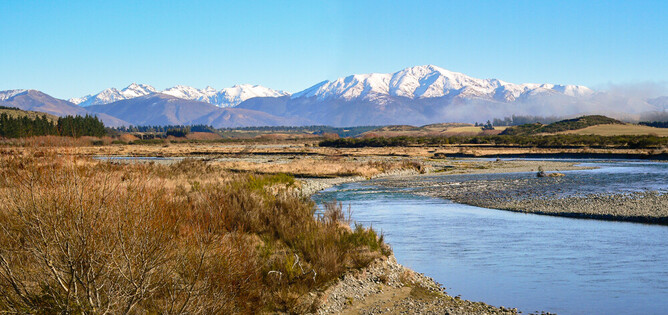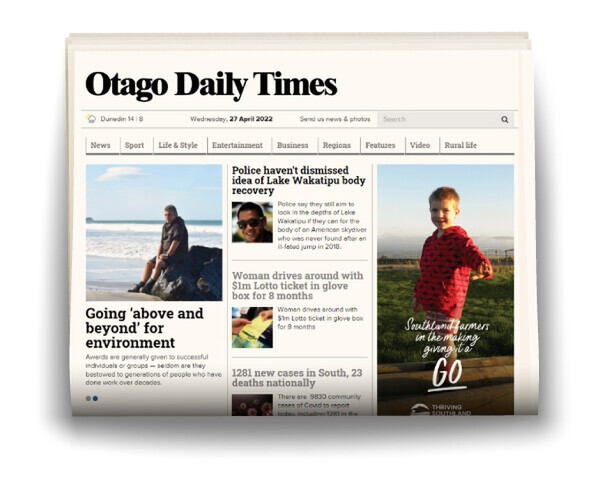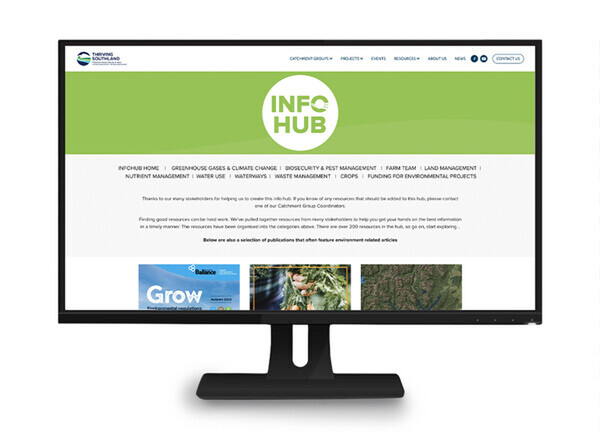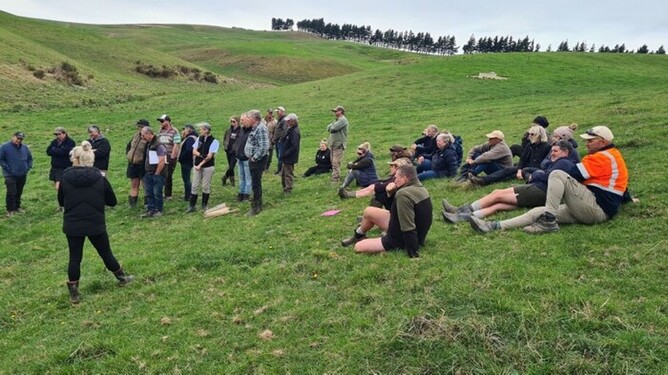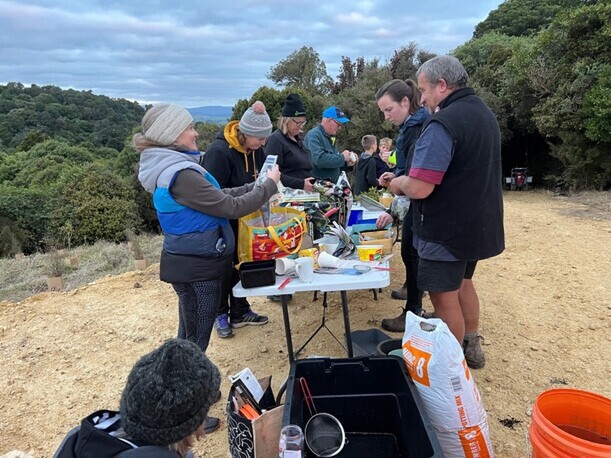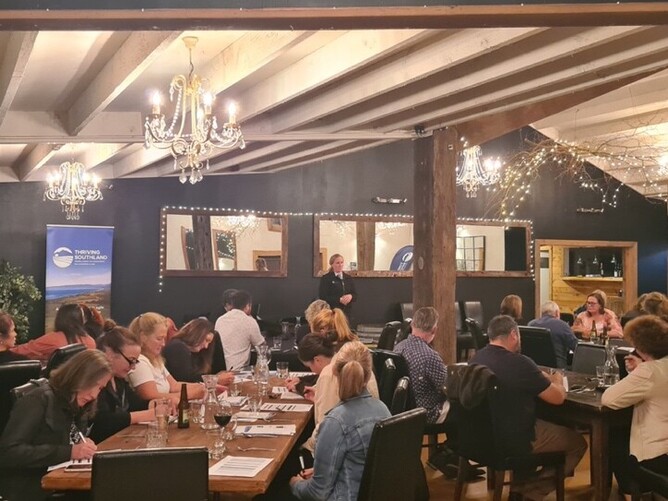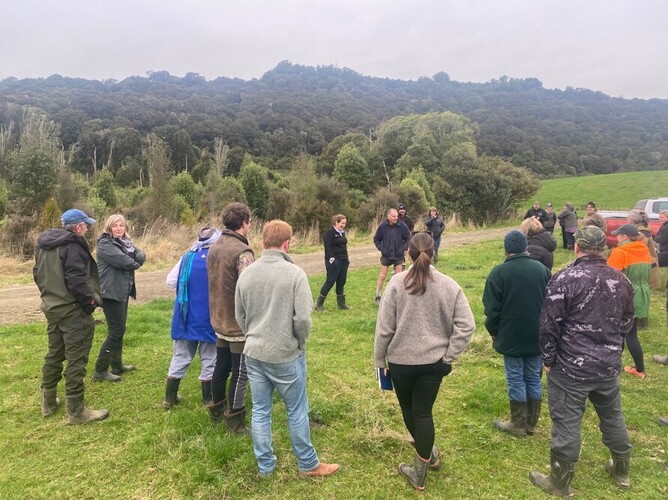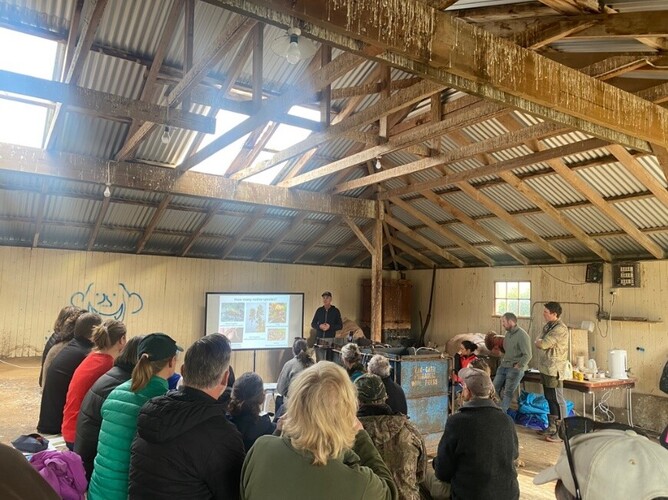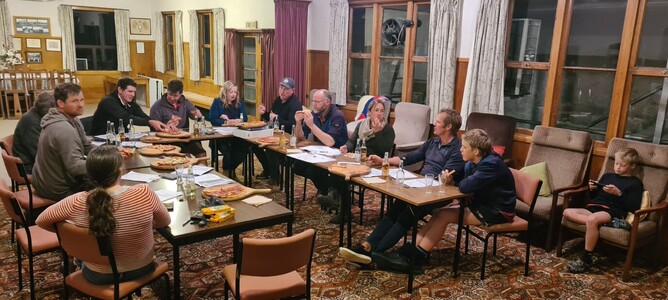Welcome to our June newsletter and happy moving day!
As we head into winter, it’s timely to take stock of where we are at - including the impressive amount of action by Catchment Groups in Southland.
There are 33 Catchment Groups in the region now - with smaller Groups popping up as more localised opportunities and challenges present themselves. One such Group, the Titiroa Catchment Group, held a biodiversity field day in May with more than 30 people attending from across Southland (read more on that below).
The great thing about Catchment Groups is that they are independent, so it’s a ground up model. Catchment Groups are getting plenty of traction all around New Zealand and the sharing of ideas is extending well beyond our region.
And with many people and animals on the 'move' today, Catchment Groups are a great way to connect with your new communities and a welcoming place to catch up with your farming neighbours.
One of the big projects being rolled out in Southland out is the 'Understanding your Landscape Resilience | Beyond Regulation', which is a unique partnership project between Thriving Southland and Land and Water Science.
We’re mapping the whole Mataura Catchment and looking at soil and landscape differences. It’s about understanding how our landscape can help mitigate emissions when we know exactly what we are farming on.
It’s fascinating seeing changes in soil types paddock to paddock - often confirming what farmers have known or suspected, and assisting them to have full confidence in how to plan ahead and manage their properties. Check out the informative video about the project.
We’d love more people to get involved in Catchment Groups, so if you know anyone who might be keen, flick them an invite to join their local Group - Catchment Group contacts can be found here.
Give it a Go campaign
The Give it a Go campaign, that celebrates Catchment Group activity in Southland is tracking extremely well on social media. The campaign, running on Facebook, Stuff and ODT online is achieving higher than industry standard clickthrough rates (CTR) which tells us that we’re on the right track and people are engaging with the campaign.
You’ll see plenty of adverts in the coming weeks, as we thank those who ‘gave it a go’, celebrate those who have ‘given it a go’ and encourage others to ‘give it a go’.
The Thriving Southland Info Hub
Thriving Southland has collected the best resources from stakeholders and put them in one place to make it easier for you to find the answers you’re looking for. Take a look at our new and improved comprehensive online Info Hub. Going forward, we are going to showcase a resource in each newsletter to give you a taster of what’s on offer.
June’s resource of the month - the AgMatters website.
How much do you understand about Climate Change, the Greenhouse effect, He Waka Eke Noa, your farm emissions and the options available to reduce farm emissions? The AgMatters website can answer all of these questions in an easy to navigate website.
For more Greenhouse Gases and Climate Change resources, visit the Info hub.
Catchment Group Profile
Waikawa Catchment Group
When did the Group start and describe the area?
The Group started in 2009 and the catchment includes the coast, native bush, farmland and the Waikawa Estuary. It’s an area with established natural biodiversity, defined by the Waikawa River that flows into the estuary.
How many members and who are they?
There’s more than 30 people and the Group is a wide network of community members who work together. The Group has a desire to continue to learn about their catchment, what's happening in the water, bush and on farm, growing this knowledge base and continuing to learn.
Vision: To have a catchment we are proud of, to have a river with the highest of water quality and a community which is committed to its environment.
Values: Long-term community commitment to care for our catchment. To maintain and enhance all the elements in our environment. To work together to lead by example.
Projects completed/events held?
- Waikawa River restoration plan
- Previous events include an Introduction to MCI, Stream Habitat Assessments, Pest control event and On Farm Management Discussion Groups.
- Future plans include surveying pest control with their catchment members, establishing a base of existing traps, pest issues, interest in helping with their own pest control and then hopefully growing this and recording success.
Best way to get in touch?
Group coordinator Sandra Campbell on 021 400 431
Recent Events
Grow your own Natives Part 2 - Trees
The Mid Oreti Catchment Group hosted a ‘Grow your own natives’ workshop at AB Lime’s native forest “Motu Ngahere” on 28 April. The team had a quick introduction on how to identify species and process and sow the seeds, before heading out to collect their own seeds, and prep and sow them at the sowing station. Tree species such as Red Matipo, Pittosporums, broadleaf and Rohutu were a few of the species that had seed ready to be sown. Some of the key takeaway points from the workshop were:
- The most berries/seeds are often found on the edges of forests where there is light (where it’s also more accessible).
- For fleshy/fruity berries push them around in a sieve, rinse with water then pick the seeds out. Remove the flesh from the seeds to reduce rotting and fungus.
- If Pittosporums big seed pods are open, the seeds are ready for collection.
- You can dry the seeds, place them in a peat mix in a snap lock bag and keep them in the fridge for months then plant in the spring when they are likely to germinate.
- Most Southland native tree species will have seed ready to collect March to May.
- “Google lens” app can help you identify tree species –it’s a nifty wee tool.
- Seeds that were collected and sown in May will germinate in spring.
Catchment Group Forum showcases wide range of positive projects in Southland
A fabulous evening was held in early May, with 45 people from 16 Southland Catchment Groups, plus local agencies, coming together at The Hideaway for the latest Catchment Group Forum.
There was lots of talking and sharing, with great speakers, great food and great company. Huge thanks to Jana Davis from Te Tapu o Tāne - Growing Trees & Communities, Fiona Young and Craig Smith from Environment Southland, Louise Cook from the Southern Dairy Hub, Rosie Forbes and Ainsley Adams from the Mid Oreti Catchment Group, and Dana Carver from Scarlatti.
They made the evening informative and fun; talking about how to grow native plants, supporting native biodiversity, the importance of feedback and capturing Catchment Group success, future environmental challenges for Southland, and learnings from Southland wintering projects.
Titiroa Catchment Group get biodiversity lowdown
Protecting and enhancing existing biodiversity should be the first priority for farmers when considering areas of natural value, a visiting botany professor told people at a Titiroa Catchment Group field day on 13 May.
More than 30 people from throughout Southland got together at Kristy and Logan Simpson’s farm, near Tokanui, to hear from recently retired Canterbury University professor David Norton. As a leading biodiversity expert, David took those attending through an informative presentation around identifying, protecting and enhancing biodiversity, then led an exploration of local bush blocks, including Beggs Bush.
The key message was to first and foremost look after existing biodiversity on properties.
He encouraged farmers to take photos of areas of native bush on their farms and over time check photos to look for changes.
The Environment Southland biodiversity and land sustainability teams were also on hand to talk about funding support opportunities and local biodiversity projects.
David Norton taking people through a biodiversity presentation
Winter Grazing Plans and pizza a hit at Ardlussa
A great night was held in Lumsden with the Ardlussa Catchment Group in mid-May, drafting their winter grazing plans and enjoying some pizza. Thanks again to our sponsors from the Brews and Banters events, who shouted everyone the sustenance required to get their wintering plans down on paper.
Future Events
Wintering Field Day - Waikaka Catchment Group
8 June, lunch at 12.30pm, presentations starting at 1pm
Dennis and Liz O'Connell’s Farm, 87 Watts Road
To discuss good winter crop grazing planning and practices for dairy, beef and sheep. To broaden community knowledge of current and future management and planning requirements for intensive winter grazing. Supported by Environment Southland, Beef and Lamb NZ and DairyNZ.
For more information contact Craig McIntyre 027 476 1876 or Sandra Campbell (Thriving Southland) 021 400 431.
Funding for Farmers - For better environmental outcomes
Mid Oreti Catchment Group
15 June from 7pm to 9pm
Winton Salvation Army Hall
Please RSVP to Funding for Farmers https://www.facebook.com/events/490493556155383/ so Mid Oreti Catchment Group know numbers for supper (and any special dietary requirements).
Join us for an evening of speakers from various organisations who have funding or free support opportunities available for better environmental outcomes on farm or in the community. The first hour will be quick talks from the organisations that offer funding, then we will have some supper and a chance for you to chat with funders about the details.
Steering Committee Meeting - Hedgehope Makarewa Catchment Group
20 June from 4.30pm to 6.30pm
Thriving Southland Office at 231 Dee Street, Invercargill
All welcome.
Join us to chat about project communication options and upcoming events.
Winter Grazing Tour - Lower Aparima Catchment Group
22nd June, 12pm start, back to the Hall for BBQ and beers by 4pm
Fairfax Hall
Lunch, BBQ and Beers provided
Bring your water bottle, gumboots and questions.
ACE - Farm Environment Plan workshops during June
ACE, Beef and Lamb NZ and Thriving Southland are running a series of cross sector Farm Environment Plan Workshops in the Aparima Catchment.
Need a farm plan? For the home farm or your support block – come along to one of our intro farm plan workshops and we will get you sorted.
If you are looking to finish your farm plan, or update and upgrade your FEP there will be a workshop available where you can have help in all those areas - details below:
Intro/New FEP workshops
- 20 June from 10am to 3pm at Riverton, Senior Citizens
- 21 June from 10am to 3pm at Riverton, Senior Citizens
- 23 June from 10 am to 3pm at Otautau, Connect Community Centre board room
Refresh/Revisit workshops
- 27 June from 10am to 3pm at Otautau, Connect Community Centre board room
- 30 June from 10am to 3pm at Riverton, Senior Citizens
Morning tea, lunch and all workshop requirements will be provided. Once you RSVP we will send you details of what to bring with you.
These are cross-sector workshops for those that have plans already started and or want to update, refresh their existing plans. E.g. You may have a Level 1 FEP and or Farm Focus plan, you may want to add new modules to your existing plan or renew your five-year plans.
We have limited spots, so be sure to let us know if you are keen to attend.
RSVP to rachael@thrivingsouthland.co.nz
Three Rivers, Waihopai, Waikaka and Greater Dipton Catchment Groups: Reducing Waste - What can you do on your farm, in your household and in your community?
- 28 June with lunch at 12pm and 1pm start. Three Rivers; Seaward Downs Hall
- 28 June with 7pm start with supper to follow. Waihopai; Woodlands Tavern
- 29 June with lunch at 12pm and 1pm start. Waikaka; Chris Affleck’s woolshed, 192 Roberston Road, Chatton North
- 29th June with 7pm start and supper to follow. Dipton; Dipton Golf Club
Grab your friends and family and come along to one of four recycling events. Trish Rankin will talk about community, household and on farm recycling and help you figure out what you can do to reduce waste.
Otamita Catchment Group presents John Hollows and Freshwater Crayfish Farming
NEW DATE: 4 July from 4pm to 6pm
BBQ Dinner at 5.30pm and a chance to catch up with the neighbours.
Mandeville Country Club
All welcome.
The second of four Catchment meetings planned for this season. We welcome John Hollows from Ernslaw One to talk about the Crayfish projects he has been working on, including how to get ponds established on-farm and future markets.
For more information contact:
Barry Roughan - 027 688 4811
Coral McLoed - 027 669 1040
Cameron Grant - 027 220 3605
Have a great June,
Ngā mihi
Richard Kyte (Thriving Southland Project Lead) and the Thriving Southland Team
